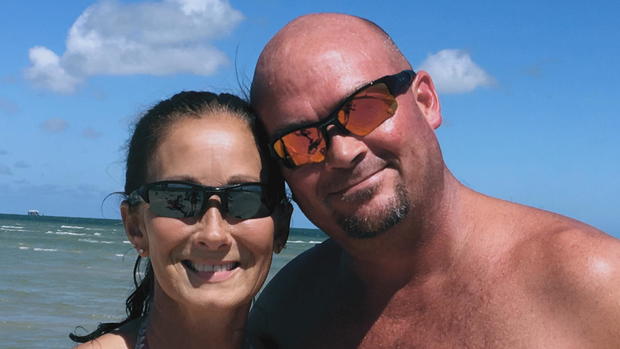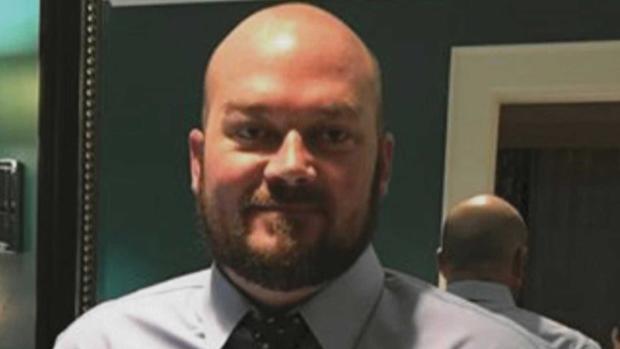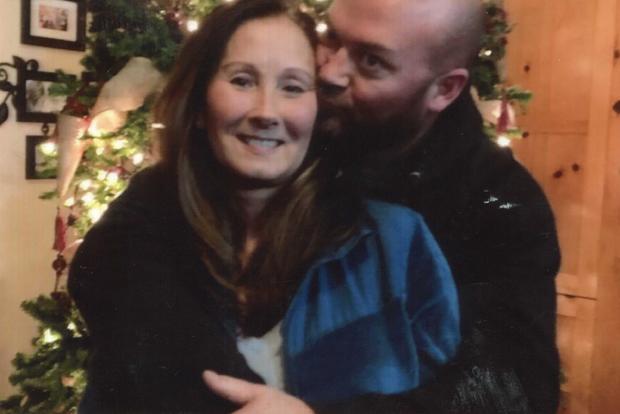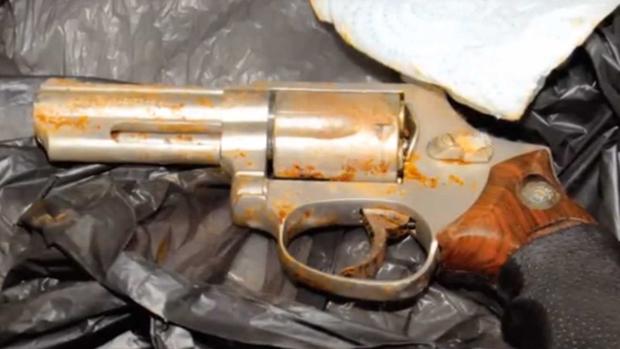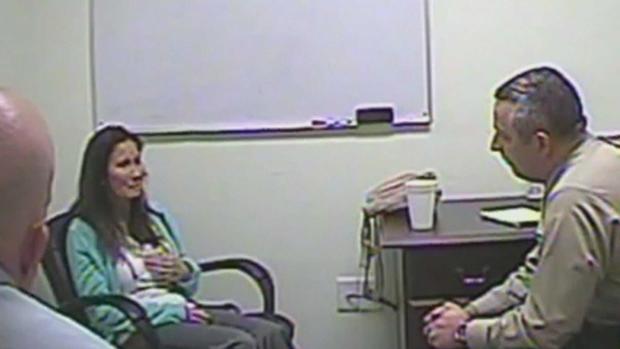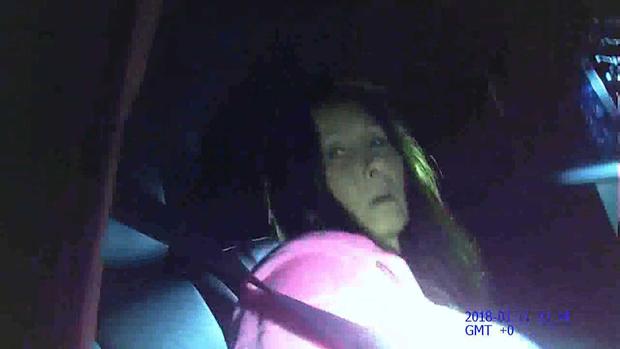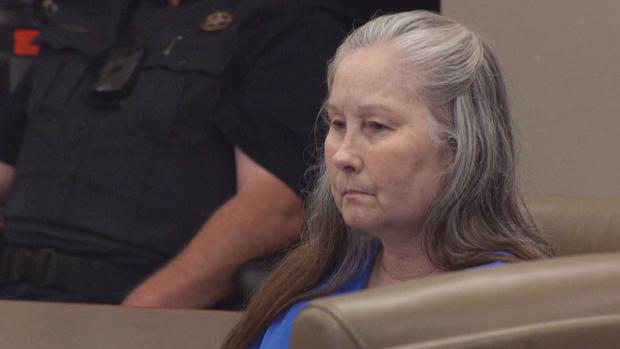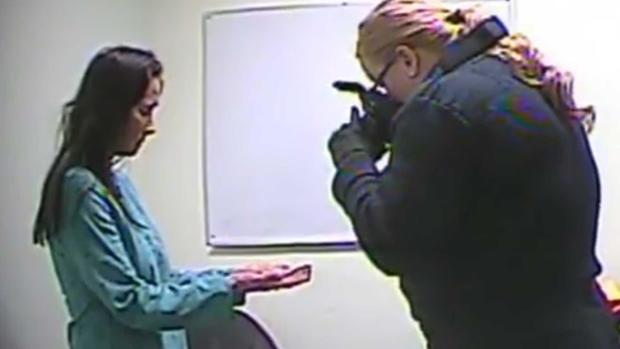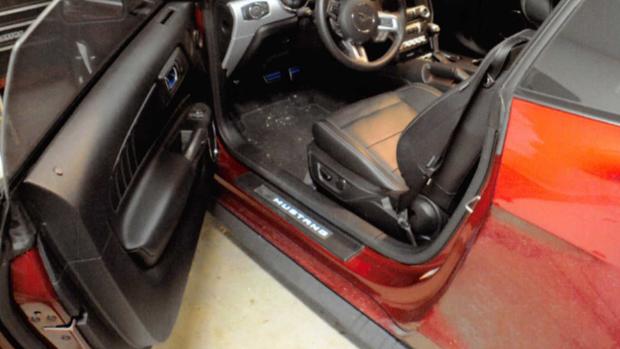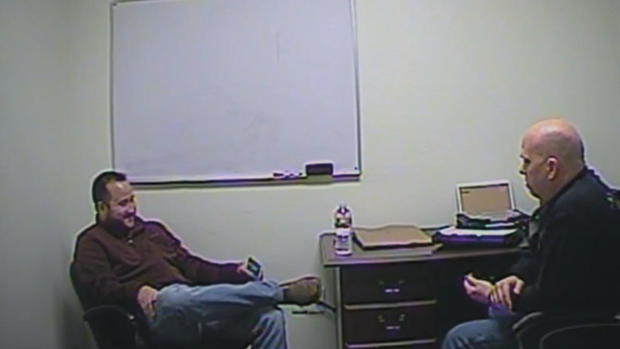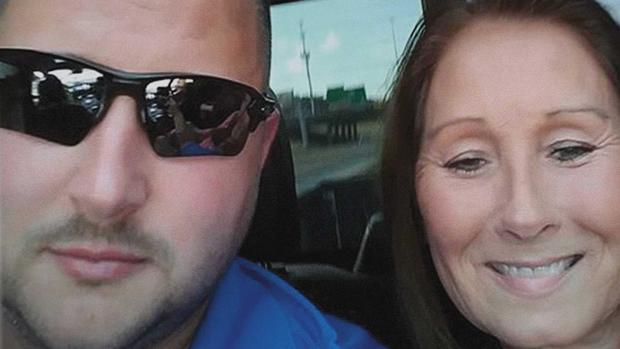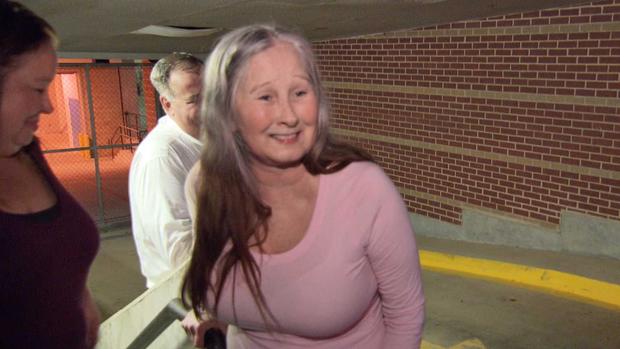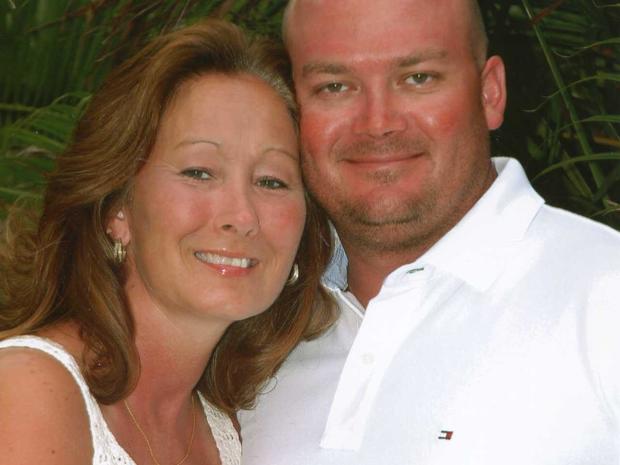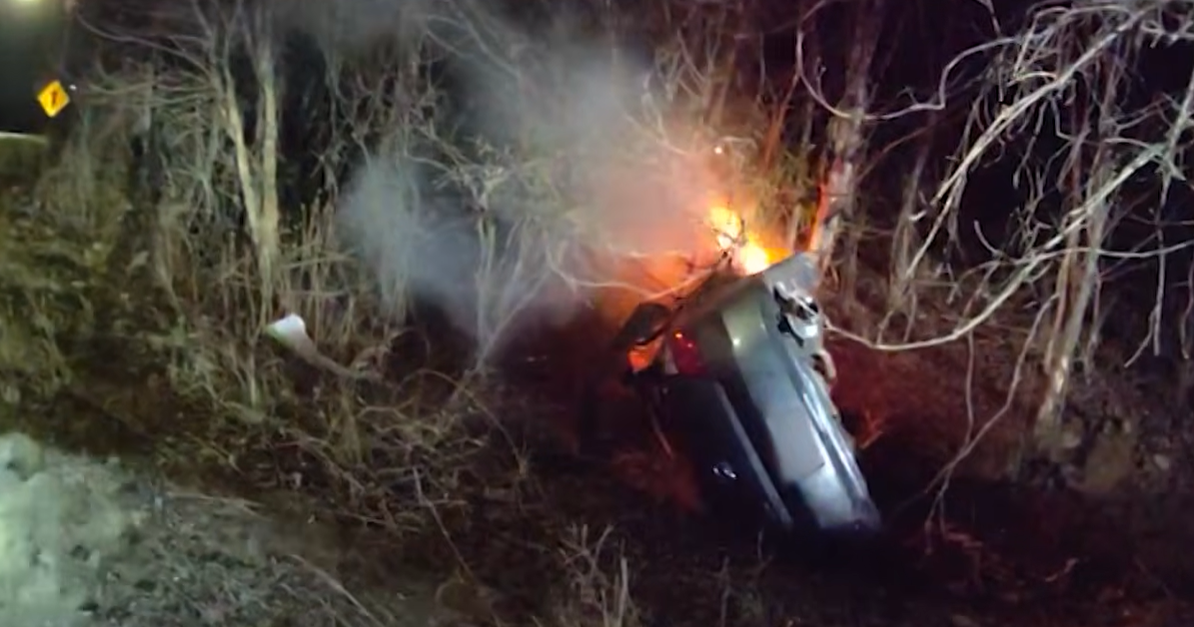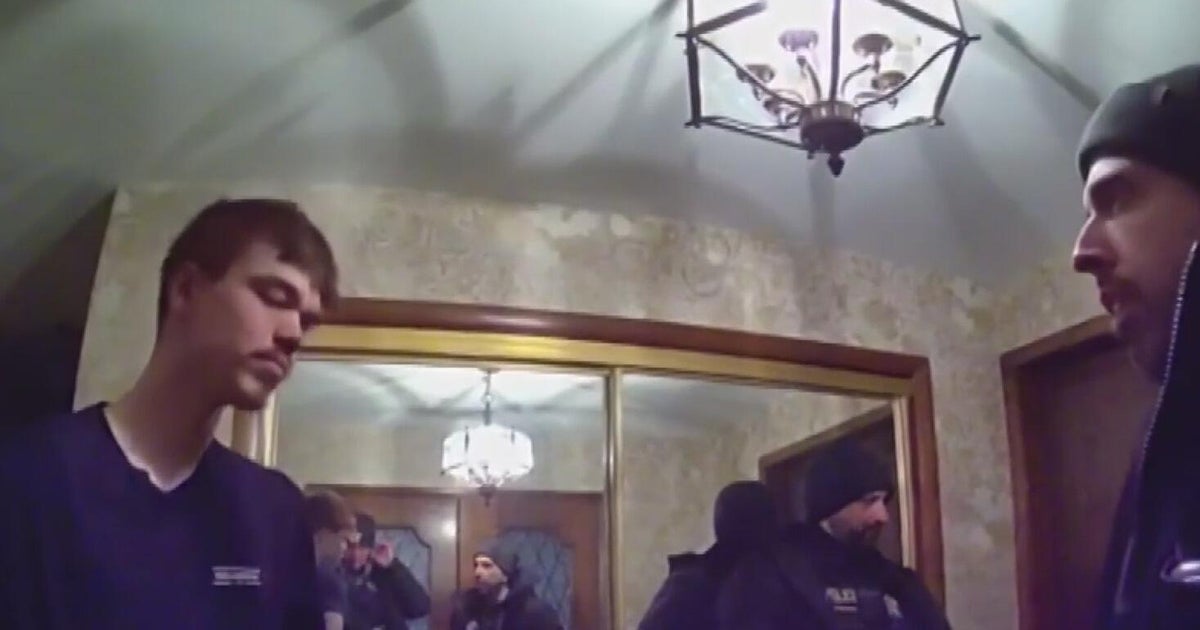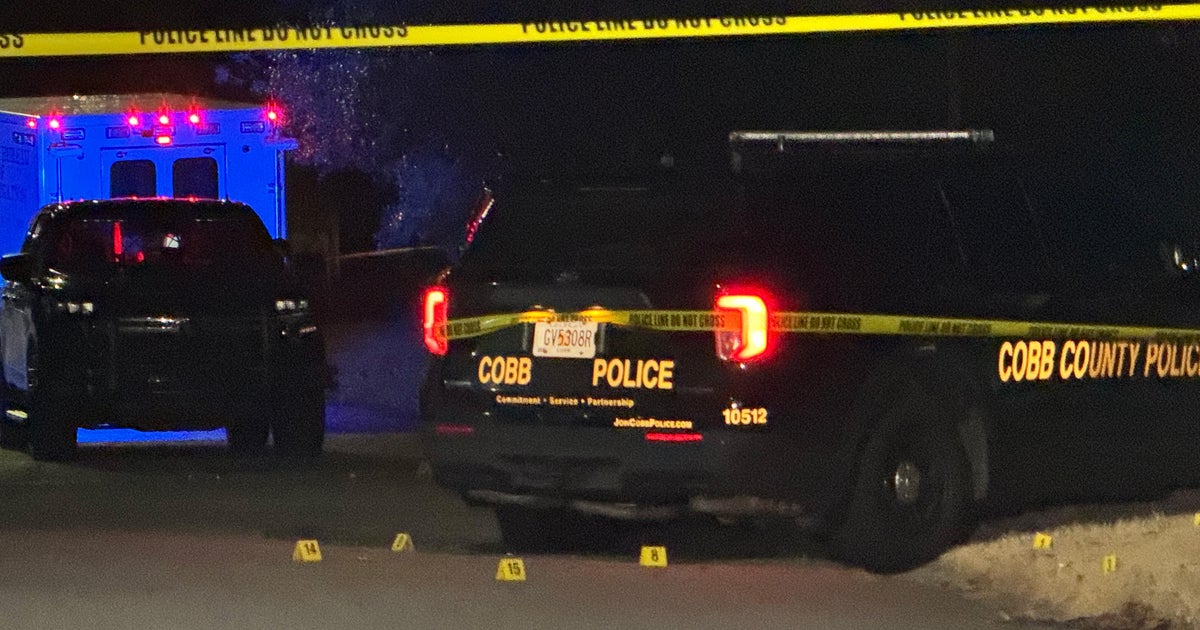"Please help him": Police body cameras show what happened after Texas man was killed
Produced by Lisa Freed and Matthew Goldfarb
[This story originally aired on March 7, 2020. It was updated on October 10.]
On January 2, 2018, Sandra Garner called 911 and said her husband had been shot by a masked intruder. When police arrived, they tried to save Jon Garner, 42, who had been mortally wounded. Police checked the house for the gunman but didn't find anyone.
With every moment captured on police body cameras, Sandra Garner walked investigators through the couple's Maypearl, Texas, home. "I knew I had to stay kind of calm to be able to tell them everything that happened," she tells "48 Hours" correspondent Richard Schlesinger.
The couple had celebrated their wedding anniversary just hours before the attack, so police were shocked to learn that in the days before the murder, someone searched for "how can I kill someone as they sleep" on her iPad, which made her more of a suspect for the investigators.
After searching the couple's home and vehicles several times, investigators found a rusty gun under the front seat of Sandra Garner's Mustang. Ballistics tests showed it was the murder weapon.
Sandra Garner was arrested and charged with murder. But did she do it? Her attorney says no and maintains someone else planted the weapon and did the searches on the iPad. He suggests it was someone extraordinarily close to his client — someone he believes police overlooked.
Video in the broadcast is the most extensive body camera footage ever shown on "48 Hours," and offers a rare look inside a murder case where everything unfolds on camera — from the first moments of the investigation to the verdict, which would stun police, prosecutors and Sandra Garner's family.
INSIDE THE CRIME SCENE
According to Sandra Garner, the last place she expected to find herself early in the morning of January 2, 2018 was at the Ellis County Sheriff's Office in Waxahachie, Texas -- not far from her home in Maypearl. Yet here she was.
Just hours earlier, she and her husband Jon had celebrated their 18th wedding anniversary and now, after a night of unimaginable violence, she was answering questions about his murder.
Sandra Garner: I didn't mind doing it at all because I wanted to help them as much as I could.
Maypearl's chief of police at the time, Boyd Norton, was in charge. He was assisted by Lt. Shane Thompson of the sheriff's office.
It was all routine. Sandra's hands were swabbed for gunshot residue, her clothes were collected, and then the questioning began.
Sandra Garner: And I knew I had to stay kind of calm to be able to tell them everything that happened …
CHIEF BOYD NORTON: Did you wake up any – before the incident happened?
SANDRA GARNER: No.
Sandra Garner: Cause I felt like if I just let my emotions go that I would lose it all. And I couldn't lose it.
SANDRA GARNER: I woke up and I had heard gunshots.
CHIEF BOYD NORTON: You heard a gunshot?
SANDRA GARNER: I heard two gunshots. … And then, somehow, I ended up in the floor beside the bed.
She says she saw a man holding a flashlight and a gun:
SANDRA GARNER [police interview]: I started screaming, you know, hoping somebody would hear me. … And he said, "shut up." I said, "please don't kill me."
Sandra Garner: And he says, "What I came here to do is done. I didn't come here to shoot you."
Richard Schlesinger: You were having this conversation with a guy who had just shot your husband?
Sandra Garner: Well, I said that, and he said it back to me. Yes.
She says he seemed to know both her and Jon, who he blamed for destroying his life years earlier:
SANDRA GARNER [police interview]: "I worked my ass off, and then he fired me. He says, "I lost my house, I lost my wife, I lost my kids."
He apparently didn't come just to kill Jon. He also wanted money.
Chief Boyd Norton: He said, "your husband had always talked about how he keeps money in the house, and I need that money. I think I earned that money." … she went into the closet … and she got the lock box.
That closet has a light that comes on when the door opens. And Sandra says that's how she got a glimpse of the killer:
SANDRA GARNER (police interview): He had a mask on … All I could see was eyes.
Richard Schlesinger: Was he tall? Was he short?
Sandra Garner: He was taller than me.
Richard Schlesinger: Do you recognize the voice?
Sandra Garner: No.
She handed him a pile of cash. Exactly how much remains a mystery.
Sandra Garner: I think it was $18,000. That's how much was in there the last time I counted it.
Richard Schlesinger: Eighteen thousand dollars?
Sandra Garner: Yes.
Sandra says, when he left, the killer gave her instructions that were frightening and a little peculiar.
Chief Boyd Norton: He told her to sit down and count to a hundred. … if he heard sirens, he was going to come back and kill her.
SANDRA GARNER [police interview]: So, I counted to a hundred as fast as I could.
Sandra Garner [counting quickly]: One, two, three, four, five six, seven, eight, nine, ten.
Richard Schlesinger: That's how fast you counted to 100?
Sandra Garner: Yes, yes.
Then she made that call to 911:
DISPATCHER: 911, what is your emergency?
SANDRA GARNER: There was a man in here, and he shot him. … Please help me.
Investigators now had Sandra's story about Jon's death, but they needed to learn the story of the couple's life together. Sandra was a twice-divorced mother of two when she met Jon. They worked as managers at the same packaging company in Paris, Texas. She was 13 years older than he was.
Sandra Garner: He was just a very sweet man.
But he was known as a tough boss.
Sandra Garner: He loved firing people, because if they weren't doing their job right, they didn't need to be working for him.
Lt. Shane Thompson: The fact that he had fired a lot of people, we knew that there were going to be people out there who didn't care for Jon.
Lt. Shane Thompson: Jon was a — kind of a wild, crazy guy. … He was prescribed antidepressants. He took those frequently, drank heavily … very outgoing, very blunt. I mean, he's out there.
None of that mattered to Sandra. Two years after they met, they got married on New Year's Eve in Las Vegas.
Sandra Garner: We had an awesome relationship. We loved each other so much. … We were partners. … and we just did everything together.
Jon became a second father to Sandra's son Wes. But her daughter Andrea was not very fond of him until 2014 when Sandra was diagnosed with Multiple Sclerosis.
Andrea Miller: I saw how much he loved her, and that's all that mattered. He took care of her. He was her rock.
Sandra Garner: The medicine made me sick a lot.
It also made her depressed. She says she thought about suicide and Googled how to do it.
Sandra Garner: "How do I kill myself in my sleep? How do I take pills to kill myself?" Or something like that.
Sandra says she didn't want to become a burden to Jon.
Sandra Garner: Well, I told Jon one day, you know, "I just — you don't deserve this, I'm just going to kill myself." And he said, "well, if you do that, I'm going to kill myself, too." … That's when I knew I couldn't do it.
As Sandra got sicker, Jon became the sole breadwinner and caretaker.
Richard Schlesinger: How reliant on him were you?
Sandra Garner: I was very reliant on him. He was all I had. … it was just me and him.
In 2016, they moved to Maypearl, population just about 1,000, to be closer to their families. Jon's father and stepmother bought the house across the street. And Jon and Sandra's backyard became the gathering place.
Jessica Garner: We were over there all the time. I mean, our families, you don't just knock on the door, you walk in.
Jessica Garner married Jon's cousin, and she became close to Sandra.
Jessica Garner: Oh, I loved her. She was family. That was Jon's wife. I mean, you love 'em. … They were super happy.
So, the news that Jon had been killed came out of the blue.
Jessica Garner: And I just started screaming. I'm like, "No. No, he's not." … It was a nightmare. It was just a nightmare.
Several hours after she arrived, Sandra left the sheriff's office to be with the extended Garner family, which had gathered to comfort her. Police body cameras captured the scene.
Jessica Garner: I'm like, "What happened? What — what's going on?" … And she told us the story.
Richard Schlesinger: Did you believe her?
Jessica Garner: I did.
Richard Schlesinger: Did everybody in the room believe her?
Jessica Garner: No.
NEW EVIDENCE UNCOVERED
To put it mildly, Sandra Garner had had a bad night by the time she left the Ellis County Sheriff's Office. And things were about to get worse. Her son Wes Miller showed up at the sheriff's office looking for her.
Lt. Shane Thompson: Wes is somebody that we wanted to speak with because … he was … the last person Jon spoke to besides Sandra.
He agreed to talk to Lt. Shane Thompson:
LT. SHANE THOMPSON: So, you were with Jon last night?
WES MILLER: Till 7.
That was just hours before the shooting. Wes says he went home and didn't know anything was wrong until Jon's family, including Jessica Garner, showed up at his apartment to give him the news.
Jessica Garner: "Jon's been killed." … and he was like, "What happened?" And we're like, "We don't know." And he's like, "How's my mom? Where's my mom?"
Wes hadn't seen his mother, but what he had to say about her sure caught Lt. Thompson's attention.
Lt. Shane Thompson: Wes, very early on had suspicions about his mother being involved.
He seemed to be wondering if his own mother could be a killer:
WES MILLER: If she did something like that, I don't understand why …
LT. SHANE THOMPSON: What's your thoughts?
WES MILLER: I don't want to tell you. I mean, it's my mom, man.
Meanwhile, at the crime scene, investigators were busy collecting evidence and taking photos.
Lt. Boyd Norton: We searched the entire house. We searched all the cars and all of the outbuildings. … Sandra's Mustang was parked inside of a detached garage. … There was nothing there.
It took hours, but the police finally left. And when they did, Sandra went home to live in the house where less than 24 hours earlier, her husband had been shot to death.
Sandra Garner: It was a little weird, yes. But I knew I needed to be there.
Richard Schlesinger: Why?
Sandra Garner: I just felt like that's where Jon would want me to be. And I was really hoping that the guy would come back.
Richard Schlesinger: You were?
Sandra Garner: So I could kill him.
Investigators already had one killing on their hands, and they were going through all the evidence they took out of the Garners' home. They were particularly interested in the Garners' electronics.
Lt. Shane Thompson: You can learn a lot about a person from their electronics.
And what they learned from Sandra's iPad and cell phone seemed especially interesting.
Lt. Shane Thompson: A few days before the murder, she's searching "how to kill somebody in their sleep." … she'd clicked on a link, "16 ways to kill somebody and not get caught."
Richard Schlesinger: What was your reaction?
Lt. Shane Thompson: Our reaction — that Sandra just became more and more of a suspect.
Richard Schlesinger: You have a gift for understatement.
Lt. Shane Thompson: [laughs]
But it would be hard to understate how well the Garner house was protected. Jon had guns — lots of guns, even for Texas.
Sandra Garner: Forty-nine pistols.
Richard Schlesinger: I'm sorry, how many?
Sandra Garner: Forty-nine. … and there was probably 12 rifles.
He had them stashed everywhere.
Sandra Garner: … because he wanted — there be a gun if he needed it.
Chief Boyd Norton: We were able to account for all their weapons except for one.
Richard Schlesinger: What kind of gun was that?
Chief Boyd Norton: A .38.
Jon Garner was killed with a 38. And, what's more, Norton says the missing pistol belonged to Sandra.
Chief Boyd Norton: Jon had given it to Sandra.
But investigators couldn't find the gun. On January 5, 3 days after Jon was murdered, investigators returned to the Garner house to search again. They wanted that gun and they looked everywhere.
Lt. Boyd Norton: We searched all the vehicles again.
And they wanted to look inside Sandra's Mustang, but this time they couldn't.
Lt. Boyd Norton: The Mustang was still inside of the detached garage, but it was locked.
Richard Schlesinger: What'd you make of that?
Lt. Boyd Norton: Well, we wanted to know why it was locked.
Wes went across the street where the family was gathered, to get Sandra's keys.
Jessica Garner: Wes walked in and said, "Hey, mom, they want the keys to your Mustang." … she threw down the fork that was in her hand and said … "F--k no. You can tell 'em to f--k off." And I just remember lookin' at her like [Jessica makes a face].
Sandra Garner: I was pissed.
Richard Schlesinger: Because?
Sandra Garner: I knew they were looking at me for it.
She says she learned police were looking at her as a suspect just that morning from Wes.
Sandra Garner: I told him, "no." He said, "yes, they are."
Richard Schlesinger: Were you scared?
Sandra Garner: No … 'cause I didn't do it.
Lt. Shane Thompson: She was not going to let us in that Mustang. … when she knew that we were getting in that vehicle one way or another, she ended up producing the key.
When police opened the car, they found a plastic bag under the front seat. Inside, wrapped in wet towels, was a rusty gun; a .38 caliber pistol with no fingerprints or DNA.
Richard Schlesinger: It is awfully odd that it was, it wasn't there one day and then 3 days later, there it was.
Lt. Shane Thompson: Very odd, yes.
Richard Schlesinger: Got any ideas how that happened?
Lt. Shane Thompson: Sandra put it there.
Jessica Garner remembers Wes coming back across the street.
Jessica Garner: He said, "They found the gun in her car." [Laughs] I just looked at him. And I mean, like, I'm gettin' goosebumps now. You just — you're like, "What?"
Richard Schlesinger: What did that mean to you at that point?
Jessica Garner: Just everything changes at that point. … She killed Jon. How could she kill Jon? Why did she kill Jon?
Sandra was brought back to the Ellis County Sheriff's Office. This time, Thompson was assisted by Texas Ranger Adam Sweaney:
TEXAS RANGER ADAM SWEANEY: Sandra, I need you to be honest.
SANDRA GARNER: I'm trying – I swear I'm trying to be honest with you. I don't – you don't think I'm being honest?
LT. SHANE THOMPSON: No.
Richard Schlesinger: And this was not a friendly conversation.
Lt. Shane Thompson: It was more confrontational.
LT. SHANE THOMPSON: Something happened? What happened?
SANDRA GARNER: I did not kill my husband!
Sandra Garner: That's when they started. "We know you did this. We know you did this." "No, I didn't." "Yeah, we know you did."
LT. SHANE THOMPSON: We want you to tell us. That's what we're here for.
SANDRA GARNER: To tell you what? You want me to say that I did it when I didn't?
LT. SHANE THOMPSON: We want you to tell us the truth. That's it.
SANDRA GARNER: I told you the truth.
LT. SHANE THOMPSON: You're not telling us the truth.
And they questioned her about her gun:
LT. SHANE THOMPSON: When did you put that gun in your car?
SANDRA GARNER: There's not a gun in my car. Are you serious? I didn't put a gun in my car, y'all. I swear. Where was there a gun in my car?
Lt. Shane Thompson: She stuck to her story. She claimed she had no idea how the gun got there.
SANDRA GARNER: No, you're trying to get me to admit to something I didn't do.
LT. SHANE THOMPSON: No, ma'am.
SANDRA GARNER: Yes.
LT. SHANE THOMPSON: No.
SANDRA GARNER [voice raised]: Yes. And I'm done talking to you.
Sandra Garner: I was upset, because they didn't believe what I was telling them, you know. Why would they not believe it?
That might be because 5 days later when the ballistics tests came back, they showed the gun in the Mustang was the one used to kill Jon.
With that, just a few hours later, when Sandra pulled into her driveway police were waiting.
Sandra Garner: I just got out of the car and they said, "We're arresting you." … It was horrible.
The Garner family was watching from across the street as the woman who had been so close to all of them was hauled off in handcuffs.
Jessica Garner: I'll be completely honest. We cheered.
Richard Schlesinger: You cheered?
Jessica Garner: We cheered. And I know that's horrible to say, but it was just a little piece of justice at that moment for Jon.
THE MISSING EVIDENCE
After police arrested Sandra Garner her bond was set at $2 million. There was no way she could pay that.
Tom Pappas | Sandra Garner's attorney: They made her sit in jail for a year-and-a-half, and that should have never happened. She's not the kind of person that would do that to Jon.
In September of 2019, Sandra Garner, aged by prison, got to tell her story to a new audience. In front of a jury, she went on trial in Waxahachie Texas, for murdering her husband Jon.
Richard Schlesinger: Were you prepared for what that was going to be like?
Sandra Garner: No, I didn't know what all was gonna be said. ... I was hopeful. They didn't have anything to prove absolutely that I did it. So, I was confident.
But prosecutors Lindy Beaty and Ricky Sipes believed they had a strong case against her.
RICKY SIPES [in court]: The murder weapon was Sandra Garner's gun.
Lindy Beaty: Anybody you tell this story to, says "Who comes to commit a murder and doesn't bring their own weapon?
Beaty ridiculed Sandra's story about a killer coming in, but using Sandra's gun:
LINDY BEATY [in court]: Dammit! I forgot the gun!
At times, she acted out the role of the killer:
LINDY BEATY [in court]: I wore my trusty mask so no one would know who I was. But I'm gonna have a 10-minute conversation with Sandra about who I am and why I'm doing this.
And there were those ghoulish searches on Sandra's iPad about killing someone and not getting caught:
LINDY BEATY [in court]: Big deal. And we did make a big deal about these.
Prosecutors could well have considered this case a slam dunk.
Lindy Beaty: Sounds good for us, right? Sometimes we don't get that much.
But this was a hard case.
Lindy Beaty: We knew we had a mountain of hurdles to overcome in this trial.
TOM PAPPAS [in court]: Make no mistake, she didn't shoot Jon.
The prosecution's biggest hurdles may have been the result of poor police work. Especially Maypearl Police Chief Boyd Norton's lack of experience leading an investigation.
Chief Boyd Norton: Obviously, I had been to many murder scenes. But as far as … being the investigator on the scene, this was my first.
He had enough experience to know he had to look into all those people Jon had fired over the years.
Chief Boyd Norton: We interviewed probably a couple of dozen people … who had been terminated and we were not coming up with any suspects.
But Norton is more open and more honest than most people would be about the mistakes he made at various stages of the investigation.
Richard Schlesinger: Was the crime scene secured, in your view, quickly enough to preserve all the evidence?
Chief Boyd Norton: No. ... I probably should have taken her out of the house and put her in a car. I probably should have bagged her hands, and I should have done some other things.
Police might have made a huge mistake by not bagging Sandra's hands. Gunshot residue was discovered on her – but it was only a tiny amount that could have an innocent explanation, says the defense.
TOM PAPPAS [in court]: Sandra was lying right next to Jon when he was shot. ... she pulled the body off the bed and she did chest compressions.
Tom Pappas: The fact that there were only three specks on her left arm wasn't consistent with her firing the weapon.
Investigators believe if Sandra's hands had been bagged they might have found a lot more gunshot residue — enough to prove she did fire that gun.
Police might also have failed to preserve the crime scene well enough. First responders came in and out.
Sandra Garner: A lot ran in the bedroom when I was still there, which I thought was strange because that's where it happened. So why run and mess up everything that could be evidence?
And important evidence was lost by the police themselves. Body camera footage shows Chief Norton taking photos of the scene right when he arrived. A lot of them. And they all inexplicably disappeared from his cell phone.
Richard Schlesinger: How did you feel when you realized that these photos were missing?
Chief Boyd Norton: Well, I felt bad. I had evidence that should have been with the case, and it wasn't there. So yeah, I was embarrassed.
Richard Schlesinger: Problem for the case.
Chief Boyd Norton: Yes, sir.
Instead, the prosecution had to use photos taken by the Ellis County Sheriff's crime scene investigator 8 hours after the murder.
TOM PAPPAS [in court]: The investigation's messed up.
The mishap with the photos seemed like a gift to defense attorney Tom Pappas.
Richard Schlesinger: What did you think when you heard that these photos had been lost?
Tom Pappas: I think we're going to win.
Richard Schlesinger: Do you regret not handing this whole thing over to Ellis County right away?
Chief Boyd Norton: I do. I do.
Richard Schlesinger: When did you realize that that was a mistake?
Chief Boyd Norton: Probably about a week into it.
RICKY SIPES [in court]: Law enforcement poured their heart and their soul into this investigation. It may not have been perfect.
And prosecutors knew the chief's inexperience would not play well in front of the jury.
Richard Schlesinger: Did Chief Boyd Norton fill you with confidence?
Lindy Beaty: No.
Ricky Sipes: No.
Prosecutors found themselves having to explain, among other things, why the police didn't fingerprint the door handle of the Mustang where the gun was found. Pappas says police might well have found a fingerprint that belonged to another suspect.
Ricky Sipes: As prosecutors, we want 'em to do everything possible that they could do. … I believe that it should've been done.
Chief Boyd Norton: You know, I told you up front that we'd made some mistakes in this case. … Should we have taken the car and impounded and processed it? Maybe, but we didn't.
Pappas attacked every phase of the investigation:
TOM PAPPAS [in court]: Police searched that house and they screwed a lot of stuff up.
He wanted to know why it took police so long to get to the crime scene in the first place.
Tom Pappas: You get a ... 911 call from a lady who's hysterical that says there was an intruder and my husband's been shot, and it takes them 30, 40 minutes to get to the scene?
Richard Schlesinger: Well, Chief Norton says he was there in 15 minutes.
Tom Pappas: Even 15 minutes is crazy.
Prosecutors had one other huge problem: proving a motive. Why would Sandra want to kill her husband, who was her caretaker?
Lindy Beaty: We did not have one set motive. Here is the motive. This is the reason why she killed him.
In Texas, prosecutors don't have to prove motive.
Lindy Beaty: But as a human being, everybody wants to know why.
But Pappas says there was one person who was close to Jon and may well have had motive to kill him. And, what's more, at every turn in the case, he was there — Sandra's son Wes.
Lindy Beaty: We knew Wes was gonna be a problem from the get-go.
WES MILLER [to investigators]: What I say to you are you going to play it back to my mom?
Lindy Beaty: Wes does look bad.
WAS SANDRA SET UP?
Defense attorney Tom Pappas says the police made one of their biggest mistakes when they ruled out one suspect: Sandra's own son Wes Miller.
TOM PAPPAS [in court]: Wes should have been a suspect. So, let's talk about Wes. … His conduct, when you really look at it objectively and look at Sandra objectively, is more suspicious than hers.
Lindy Beaty | Prosecutor: Well, everything Wes did was, kind of, suspicious. … I did have a lot of heartburn over it when we were going through case preparation … And we knew Wes was gonna be an absolute train wreck and he was.
Wes was involved in this case early on. Just hours after Jon was killed, Wes was the one who pointed the finger at his mother:
LT. SHANE THOMPSON: What's your thoughts?
WES MILLER: I don't want to tell you. I mean, it's my mom, man.
And he kept at it, questioning details of her story:
WES MILLER: The dogs … Why didn't they bark? How did so and so know how to get in?
WES MILLER: And for somebody to sneak up on him like that, I don't buy it.
Tom Pappas | Sandra Garner's defense attorney: One of the hardest things about the case was … the magnitude of Wes' disloyalty to her and the things he was doing to try to get her blamed for this just jumped out at you.
WES MILLER: She has never acted like this before.
Sandra now says she has come to believe the worst thing a mother could believe about her child.
Richard Schlesinger: Who do you think killed Jon?
Sandra Garner: I think it was Wesley
Pappas says those chilling Google searches on Sandra's iPad and iPhone could have been done by Wes. He says Wes had access to the devices that did not require a password.
Tom Pappas: If there's one thing everybody said about Sandra and Jon is, they went to bed at 9:30.
Those web searches were done between 11 and midnight just 4 days before the murder. And Pappas says, on the same night, Wes was at their house.
Tom Pappas: He's the one that did the website, not her.
Richard Schlesinger: Went searching for 16 ways ...
Tom Pappas: Sixteen ways to kill.
Richard Schlesinger: You don't know that for sure but go ahead.
Tom Pappas: He's — well, I don't know who else it could have been. I don't think it was Jon.
Wes Miller wouldn't answer "48 Hours"' questions, but he always seemed willing to answer investigators' questions … especially about his mother and her gun:
WES MILLER: I think it was a revolver. She used to keep it in her purse -- I would see it underneath the seat in her car. That's the last time where she kept it.
CHIEF BOYD NORTON: Which car?
WES MILLER: The Mustang.
Lindy Beaty: He's being a little bit too helpful with the police, saying, "Hey, you know, look here."
After the police searched and failed to find the gun, Lt. Shane Thompson talked to Wes again:
LT. SHANE THOMPSON: Somebody said your mom owns a .38 revolver.
WES MILLER: She does have a revolver. But I thought it was in her Mustang, and she said she never put it in her Mustang. … And if she did it would be underneath the seat.
LT. SHANE THOMPSON: Underneath the seat?
WES MILLER: [nods to affirm]
And the next day police searched for the gun one more time.
Lindy Beaty: And where do they find it? They find it under the seat … those things really did cause some concern … Wes does look bad.
Tom Pappas: It began to look like someone was setting her up. And I don't know that Wes did that, but it sure looks suspicious. And his conduct was just unexplainable.
Pappas believes Wes might have more of a motive to kill Jon than Sandra did. He says Wes needed money and mistakenly believed he was in Jon's will.
Richard Schlesinger: Was he ever a suspect in this?
Chief Boyd Norton: No … he wasn't my suspect.
After all, Wes told Chief Boyd Norton he had an alibi for the time Jon was murdered:
WES MILLER: I went back home … bought a six-pack of beer and watched Netflix.
And Netflix and phone records seemed to help corroborate his story … at least for a while.
Chief Boyd Norton: There was a record that he'd been on Netflix up till about 12:00, 12:30 … There were some phone calls that were made.
Lindy Beaty: "Oh, my God. This is perfect. Like, he's got an alibi. This is fantastic," until we look at the records and we're like, "No. No. That — that's not the right time."
Prosecutors discovered Investigators had made a mistake. The times on those records weren't recorded in Central Standard Time – the local time – which means there was actually no evidence that Wes was watching Netflix or on the phone at the time Jon was killed.
Richard Schlesinger: Didn't look good … that the cops didn't know which time zone they were dealing with?
Ricky Sipes| Prosecutor: No, it did not.
Richard Schlesinger: I would imagine it did not help your case?
Lindy Beaty: No.
TOM PAPPAS [in court]: They didn't look at Wes. They didn't understand that he didn't have an alibi, and that's an example of where they just gloss over stuff.
Lindy Beaty: They thought they had a rock-solid alibi for Wes. … when in fact that was not the case.
Tom Pappas: I was floored at that.
The prosecutors insist even though they say Wes looks suspicious at times, and he has no alibi, they are confident he is not the killer.
Lindy Beaty: Once you meet Wes, it's over. … if you just talk to him for any length of time, you know that he is just not capable of committing this type of crime. … He's just not smart enough, honestly.
And, she says, his stomach isn't strong enough.
Lindy Beaty: There's no way that guy can go put a bullet in some guy's head that he loves, see some blood, and there not be a vomit trail, you know, all the way back home.
And if Wes did break into the house that night and have a conversation with Sandra, Beaty wonders how could Sandra not recognize him?
LINDY BEATY [in court]: My God, people, if it was Wes Miller, she wouldn't know her own son? There is no way she doesn't know if it's him. There is no way.
Richard Schlesinger: You wouldn't recognize his voice?
Sandra Garner: I would think I would recognize his voice, but after hearing shot and just all the drama … I can see why I didn't recognize it.
Richard Schlesinger: Your own son?
Sandra Garner: Yes.
Richard Schlesinger: Pardon me for saying this, but it's hard to believe.
Sandra Garner: I don't know. I just -- I didn't recognize it.
There are a lot of questions for Sandra, and unlike most defendants in murder cases, she decided to take the stand. Cameras were not allowed in the courtroom for her testimony.
Sandra Garner: I felt like if it went wrong for me, if I didn't testify, what if I could have saved it?
Richard Schlesinger: Were you comfortable putting her up?
Tom Pappas: No, of course not. You're never comfortable when your client takes the witness stand.
Sandra had trouble on the stand. She struggled to answer some of the questions during a lengthy cross-examination.
Tom Pappas: I think there were some questions about the website searches and the searches surrounding that that were, that were difficult. And she simply didn't remember stuff. And they were able to make some points.
Lindy Beaty | Prosecutor: I thought that we were able to show that she was a liar.
As the case goes to the jury, Sandra should know soon if taking the stand was the smart move.
Sandra Garner: Whatever happened, I had to deal with it.
JUSTICE SERVED?
It took one month, 25 witnesses and 400 pieces of evidence for the case against Sandra Garner to finally go to the jury. And when it did, neither side was very confident.
Lindy Beaty | Prosecutor: I think I was probably 50/50 at the end of it. I felt like we ended well, so I was hopeful.
Tom Pappas | Defense attorney: I was extremely confident one minute and just distraught the next.
The jurors, however, seemed very clear about their views. They came back with a verdict in just 3 hours.
Jessica Garner | Wife of Jon Garner's cousin: God, I was nervous 'cause it all comes down to this. … You're thinkin', "God, please have done the right thing. Please find justice for this family."
Sandra's daughter Andrea was holding her breath.
Andrea Miller | Sandra Garner's daughter: The longest three hours of my life.
What did the quick verdict mean? It was anyone's guess.
Lindy Beaty: I did not think it was good for us. … I didn't feel that they had gone through all of the evidence again.
Tom Pappas: Oh, my heart must have stopped. … "This is bad, it's not good at all." I was trying to say it so Sandra wouldn't hear.
In front of a packed courtroom, the judge read the decision.
Andrea Miller: The last thing I remember is the juror handing the paper to the bailiff, and I looked down. I could not look. … I wasn't ready for a guilty verdict.
JUDGE: We the jury find the defendant, Sandra Louise Garner, not guilty.
Not guilty. And just like that, Sandra Garner was a free woman after 21 months in jail.
Sandra Garner: I felt wonderful. I turned to Tom and was like "Yay, yay," and we hugged each other. … I get to go home.
Andrea Miller: I think those were the sweetest words I've ever heard [laughs] in my life. … It was like a weight had been lifted off of my shoulders that I had been carrying for nearly two years.
Tom Pappas: I gave her the biggest hug I could. I was so happy for her. I tear up just thinking about it. I mean, she's got a chance to try to get some of her life back.
Of course, like every verdict, this one was not universally popular.
Jessica Garner: I just remember thinkin', "They — they got that wrong. What? There's no way. There's no way. … I don't wanna watch this. There's no happy ending to this. This isn't happy at all."
Unless, of course, you are Sandra Garner. "48 Hours" caught up with her the moment she was released from jail.
Sandra Garner: Feels wonderful. Feels wonderful. … I was just praying to God and my husband and my daddy just to help them say not guilty, please.
Sandra was eager to get back home, to the same house where her husband was murdered.
Sandra Garner: I love my house. And I know it's hard, and I know people think I'm crazy for wantin' to be here. But I just wanna be as close to him as I can.
Living here will mean living across the street from Jon's parents, who still are convinced Sandra is a murderess who killed their son, and whose family is still grieving.
Jessica Garner: Jon should still be alive. We should still be a family. That was taken from us. There should be justice for his killer. There's not. There never will be. … None of us have talked to her. None of us wanna talk to her.
Andrea Miller is worried about her mother.
Andrea Miller: One of the most important pieces of her life isn't here, and she has to live with that on a daily basis. … I'm scared that somethin's gonna happen to her.
Sandra's attorney Tom Pappas is also worried about her safety.
Tom Pappas: There's a murderer that hasn't been arrested that's still out there. She – part of Sandra's – I'm tearing' up now. Part of Sandra's –
Richard Schlesinger: Let me ask you why you're tearing up? Tell me about it.
Tom Pappas: Because I care about her. I care what happens to her. I care about what happens to the people around her.
Whatever happens to Sandra, it likely will happen without her son Wes. Prosecutors and police believe they tried the right person and don't consider Wes a suspect. But Sandra and Andrea are no longer speaking to him.
Andrea Miller: He does not deserve to be part of my mother's life anymore. … As far as I'm concerned, I don't have a brother anymore.
Richard Schlesinger: This is a tough question … do you still love your son?
Sandra Garner: Not like I used to, no. I have not spoke to him at all. He did me really wrong.
Richard Schlesinger: And what toll has that taken on you?
Sandra Garner: It's very hurtful. But he chose that. I didn't.
Sandra Garner is now free to spend time with what remains of her family. She knows others still see her as a killer who got away with it. In the eyes of the law she is not guilty and the case against her is forever closed.
Richard Schlesinger: Under the law, you cannot be charged with this crime again. Even if you say you did it. So, let me ask you … did you kill your husband?
Sandra Garner: No. Man was the love of my life. I told you, he was all I had. He was going to take care of me for the rest of my life. Without him, I have nobody. No, I didn't kill my husband.
Jon Garner's family moved out of the house across the street from Sandra.
They believe Wes was not involved in Jon's murder and remain close to him.

